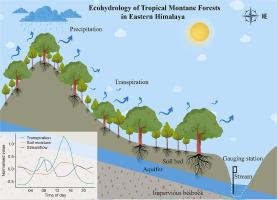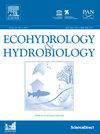Role of transpiration in modulating ecosystem services in secondary tropical montane forests of Eastern Himalaya in India
IF 2.2
4区 环境科学与生态学
Q2 ECOLOGY
引用次数: 0
Abstract
Secondary tropical forests provide critical hydrological services through modulating transpiration and soil infiltration of precipitation. However, vegetation studies establishing direct mechanistic linkages between stand transpiration, soil moisture and streamflow are significantly lacking in tropical montane forests (TMFs) in Himalaya. We quantified the impact of diel and seasonal transpiration on catchment water balance and lean season streamflow in a broad-leaved evergreen secondary TMF in Eastern Himalaya. Stand transpiration (T) and streamflow (Q) were measured concurrently at one of the wettest (4500 mm yr−1) and highest elevation (2100 m) sites worldwide to date. The observed daily transpiration rates (1.29±0.99 mm d − 1) were double the reported values from TMFs in relatively drier Central Himalaya but at the lower bound of TMFs globally. Moderate precipitation pulses (10–25 mm volume) followed by clear skies significantly increased stand transpiration. The proportional contribution of evaporative losses (50–77%) and stand transpiration (2–13%) to catchment water balance increased with the progression of the wet season. The phase lags between T, soil moisture (S) and Q were confounded by significant pre-dawn sap flux movement and the presence of secondary diel peaks. Transpiration was a significant predictor of streamflow in the dry season and, to a lesser extent, in the wet season. Thus, changes in vegetation cover and precipitation patterns will likely impact hydrological services from the regenerating secondary TMFs and the regional water security in the Eastern Himalaya.


蒸腾作用在调节印度东喜马拉雅山热带山地次生林生态系统服务中的作用
热带次生林通过调节蒸腾作用和土壤对降水的渗透提供重要的水文服务。然而,喜马拉雅山区的热带山地森林(TMFs)中非常缺乏建立林分蒸腾、土壤水分和溪流之间直接机理联系的植被研究。我们量化了东喜马拉雅地区常绿阔叶次生 TMF 中日蒸腾作用和季节蒸腾作用对流域水平衡和枯水期溪流的影响。我们在迄今为止全球最潮湿(4500 毫米/年)、海拔最高(2100 米)的地点之一同时测量了林木蒸腾(T)和溪流(Q)。观测到的日蒸腾速率(1.29±0.99 毫米)是相对干旱的喜马拉雅中部地区 TMF 报告值的两倍,但处于全球 TMF 的下限。晴朗天气之后的中度降水脉冲(10-25 毫米降水量)显著增加了林分蒸腾作用。蒸发损失(50-77%)和林分蒸腾(2-13%)对集水区水分平衡的贡献比例随着雨季的到来而增加。T、土壤水分(S)和Q之间的相位滞后与黎明前显著的树液通量移动和二级昼夜峰的存在有关。蒸腾作用对旱季的溪流有重要的预测作用,对雨季的预测作用较小。因此,植被覆盖和降水模式的变化很可能会影响再生次生迹地生态系统的水文服务和东喜马拉雅地区的水安全。
本文章由计算机程序翻译,如有差异,请以英文原文为准。
求助全文
约1分钟内获得全文
求助全文
来源期刊

Ecohydrology & Hydrobiology
Agricultural and Biological Sciences-Aquatic Science
CiteScore
5.40
自引率
3.80%
发文量
51
期刊介绍:
Ecohydrology & Hydrobiology is an international journal that aims to advance ecohydrology as the study of the interplay between ecological and hydrological processes from molecular to river basin scales, and to promote its implementation as an integrative management tool to harmonize societal needs with biosphere potential.
 求助内容:
求助内容: 应助结果提醒方式:
应助结果提醒方式:


